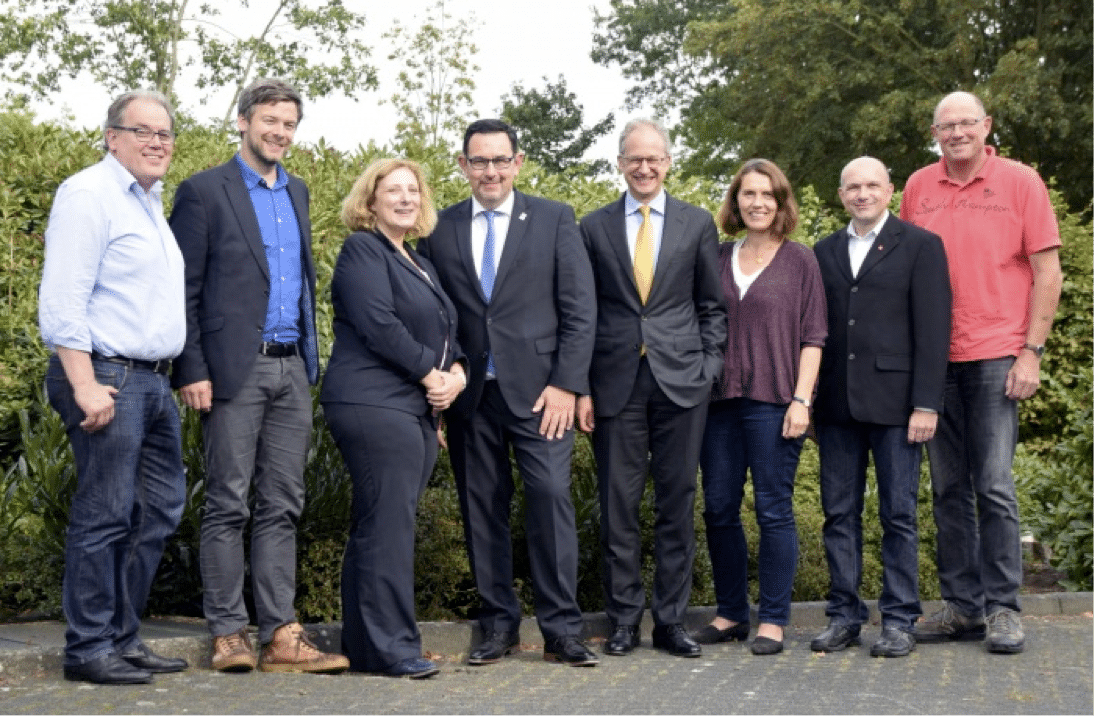Böcking: Round table should bring greater clarity
Bundestag member Daniela De Ridder and State Secretary Michael Rüter visit Klasmann-Deilmann
Member of the Bundestag Dr Daniela De Ridder (SPD) has been on a visit to the Klasmann-Deilmann Group in Geeste. Managing Director Moritz Böcking brought her up to date with company developments in respect of peat harvesting, growing media and renewable energies. The meeting was also attended by the Federal Representative of Lower Saxony, State Secretary Michael Rüter, and the chair of the Emsland District SPD association Andrea Kötter. Moritz Böcking presented the visitors with his views on the need for alternative concepts for land development and State Secretary Rüter offered to help by bringing this issue to the attention of Hanover and Berlin.
Klasmann-Deilmann’s managing director Moritz Böcking and Michael Rüter were in agreement that the different views on peat harvesting in Lower Saxony now had to be aired in a constructive debate. Böcking pointed out in this connection that the company has for many years been making successful efforts to use both peat and alternative materials in its growing media products.
“The discussion has been given a new impetus”, concluded Böcking. “We are now finding that we have something in common even with the environmental groups and other NGOs as soon as we point out that more than 40% of our products flow into the food economy.” In this respect Daniela De Ridder referred to the potential for setting up joint projects on development aid. “There is now a great deal of talk about fighting the root causes of migration at source”, she said. “Measures that promote self-sufficiency in food could therefore represent a small but extremely useful step forward.”
Böcking: a paradigm shift is needed
In view of the very limited opportunities for land development in Germany Böcking called for a paradigm change in this area. “The establishment of short-rotation plantations designed to produce sustainable fuels and the management of land for peat moss cultivation could deliver real progress in Lower Saxony when it comes to climate protection and the extensification of land use”, he explained before adding:
“To this end, however, we need to re-think those regulations that have in some ways become outdated or have developed in the wrong direction. Our industry is in any case reliant on support and funding for initiatives of this kind, especially where the provision of peat alternatives are concerned.”
In order to provide more information on this subject Michael Rüter proposed holding a round table “Garden and Soil 4.0”. “This will give all stakeholders a chance to have their say, exchange arguments, overcome any reticence and preconceptions and engage in a direct debate of the real issues. New initiatives are always welcome, especially from the SME sector”, says Rüter. “An open debate needs to be held as soon as possible – one that also includes the peat industry – if the opportunities available to us are not to be thrown away.”
On conclusion of the talks with the Klasmann-Deilmann Group in Geeste State Secretary Rüter went on to visit the Emsland Peat Museum. He was accompanied by Bundestag member Daniela De Ridder and the chair of the Emsland District SPD Association Andrea Kötter.

Discussing the options for sustainable land use (from left): Peter Kramer, chairman of the Geeste branch of the SPD, Geerd Smidt, sustainability manager (Klasmann-Deilmann), Bundestag member Daniela De Ridder (SPD), State Secretary Michael Rüter, Managing Director Moritz Böcking (Klasmann-Deilmann), Andrea Kötter, chair of the SPD District Association, and Carsten Primke, head of the SPD’s Meppen office.